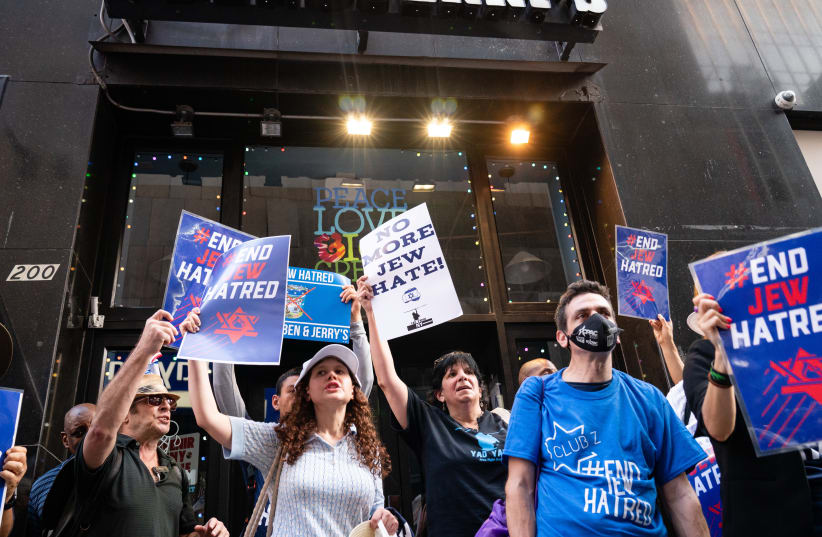Seasons and styles come and go but antisemitism remains as persistent as ever. That was certainly the case at the first preview of the current Broadway revival of Parade, a musical meant to share history but which instead served as an all too real message for the present.
Parade, which originally premiered in 1998, tells the true story of Leo Frank, a Jew in Georgia falsely accused of murdering a young woman in 1913. Not only was he wrongfully convicted after a sham trial but he was eventually kidnapped from prison and lynched by an antisemitic mob.
Good theater is meant to transport its audience back in time or to another place. Unfortunately, attendees of the revival’s first preview on February 21 had such an experience before they even entered the theater, as they got a taste of the hatred and vile rhetoric that convicted Leo Frank, courtesy of screaming protesters taunting them as they entered the theater.
Seasons may change, but antisemitism doesn't
The antisemitic libel described in Parade’s script is an accurate reflection of the antisemitism then, as well as now. With protesters screaming, “You want the truth about who you’re going to see tonight? You’re paying $300 to go worship a pedophile,” and others holding a banner with a link to the website of the National Socialist Movement, a US-based neo-Nazi group, the scene could have been taken straight from the stage.
The cast and crew did an admirable job of standing up to this blatant Jew-hatred, with lead actor Ben Platt, who plays Frank, stating, “It was definitely very ugly and scary but a wonderful reminder of why we’re telling this particular story...” However, the question must be asked, how is it that we are 110 years since the vile events portrayed in Parade, yet the hatred remains the same?
Antisemitic attacks and rhetoric are on the rise. The Anti-Defamation League (ADL), established in large part as a response to the Leo Frank incident, reported that 85% of Americans believe in at least one anti-Jewish trope. A particularly concerning aspect of this rising antisemitism is the fact that the “quiet part” is now being unabashedly declared for all to hear.
From celebrities like Kanye West sharing antisemitic posts on social media, to a former President inviting a known Holocaust denier to his home or You People, a Netflix movie that blatantly pushes antisemitic stereotypes in a misguided attempt to get laughs, it seems like what was once said in dark corners is now becoming more acceptable to shout from the proverbial soap box.
Despite the marked uptick in antisemitic incidents, some people instinctively rush to find excuses for them, with sentiments like “Oh, it’s just a small group,” or “If we confront it, we are scared that it will be encouraged,” or even “That will never happen here.”
Such reactions of denial rather than confrontation, of hiding rather than standing up against, simply allow antisemitism and other forms of bigotry to blossom in the fertile soil of hatred. A strategy is needed to fight antisemitism and it can be broken down into education, dialogue and confrontation.
First and foremost, we must educate ourselves and our allies on the history and modern narrative of the Jewish people and on the history of the hatred that has always been rife against us. Second, we must reinforce that knowledge with open dialogue.
No matter how bleak the situation seems, we cannot allow hatred to blind us from the path of discourse. We are strengthened by our ability to not only see a better future but work toward it through true discourse.
Finally, confrontation: At the end of the day, those who spread this hatred are simply bullies and we cannot let them push us around. Report antisemitic incidents you see online and in the real world. Reach out to professional organizations that can help you create a community united against hate. We must confront this hatred wherever it rears its head while being mindful to stay safe. The options are out there so use them.
By utilizing and expanding on these three tools, we can push back against this constant seed of evil and prevent it from growing more roots. Antisemitism may not have changed in 110 years but our ability to be united against it has. We cannot hide or say, “it will never happen here.” Instead, let us all internalize the lessons from Leo Frank’s tale, lessons confronted in the past and today, to make sure that we stand up and fight against the rising tide of hatred.
The writer is the project manager at the International Legal Forum, an Israel-based network of over 4,000 lawyers and activists around the world, standing up for Israel and combating antisemitism in the international legal arena.
